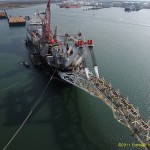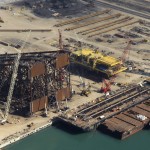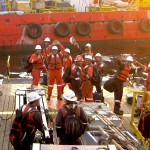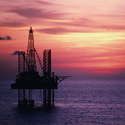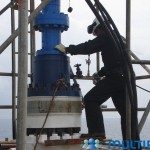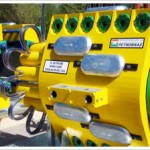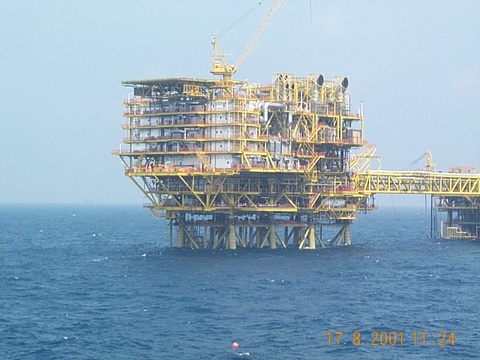
ANPGA Platform. Picture taken just after DB30 Complete all Heavylift works.
The first commercial hydrocarbons from the Angsi field were produced in December 2001 via the Angsi complex, which comprises a central processing platform bridge-linked to a wellhead platform. Production rates are expected to climb from an initial 15,000b/d of oil and 60mmcfd of gas to peak volumes of 65,000b/d and 450mmcfd.
Developed jointly by 50:50 co-venturers PCSB (operator) and EMEPMI, Angsi is located 160km offshore Terengganu in a water depth of 69m. The Angsi field is the first to be developed under the new Gas Production Sharing Contract, signed in November 1998.
Over 300km of pipelines were installed as part of the development of the Angsi Complex, including connections to production facilities on platforms Guntong D, Seligi A and Tapis and a new 166km pipeline to shore.
The development of Angsi is a key element in meeting Malaysia’s burgeoning energy needs in the coming decades, with 160 million barrels of oil and 1.4 tcf of gas expected to be produced from the field.
An additional Angsi development phase is currently under evaluation to further maximise resource recovery.
The completed project facilities will be operated by PCSB, except for the host tie-ins at Guntong-D (GuD), Irong Barat-A (IBA), Seligi-A (SeA) and the Onshore Slugcatcher (OSC) which will be operated by EMEPMI.
Consisting of a central processing platform (ANPG-A), a drilling/riser platform (ANDR-A) and a 100m interconnecting bridge, the complex will process oil and gas from Angsi field satellites, such as the Angsi-B drilling and production platform (ANDP-B), and future nearby platforms.
The Angsi complex will provide fully integrated support for drilling up to 52 wells, with facilities including two gas compression trains, gas lift and dehydration, power generation, water injection, gas sales, produced water handling and a 16MW power generation plant.
The ANPG-A topsides are the largest yet built in Malaysia with a total weight of 12,500t, configured with five modules sitting on a two-piece module support frame. Space is allocated for a future compression module, and accommodation for 100 personnel is available. Constructed by Sime SembCorp Engineering (SSE) in the southern state of Johor, the topsides are supported by an eight-legged steel piled substructure.
ANDR-A, the largest drilling/riser platform built in Malaysia to date, constructed by Malaysia Shipyard & Engineering (MSE) in Pasir Gudang, Johor is complemented with a satellite platform, ANDP-B, with a capacity of 32 additional production wells, located 6km to the west.
Dehydrated, compressed gas from the Angsi complex will be transported via pipeline to the Onshore Slug Catcher.
Combined crude and condensate will be exported to Terengganu crude oil terminal via the Irong Barat-Tapis pipeline system. The complex will also serve as the processing centre for nearby platforms as well as a hub for gas from Guntong, Seligi, Besar and other southern gas fields.
The Angsi development includes the Southern Gas Pipeline system, the main infrastructure of Malaysia’s southern gas hub, which provides critical gas sales and security of supply to the Peninsular Gas Utilisation (PGU) pipeline network, while helping Malaysia to continue as a major regional gas exporter.

